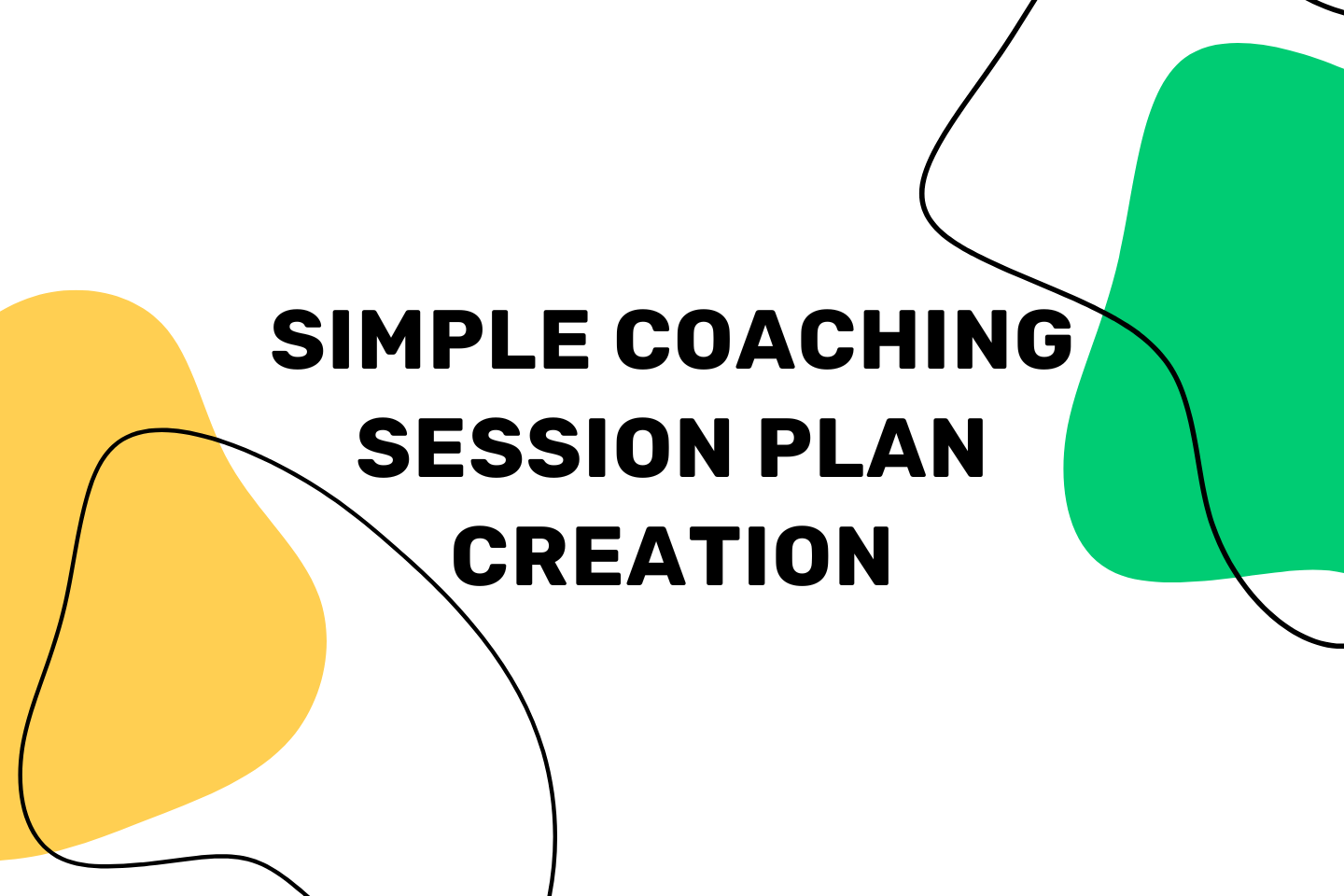Many new coaches walk into a coaching session and say, “what’s on your mind today?”
The structure of the coaching session then becomes a Q&A session of various challenges the client is facing.
The problem with a Q&A style coaching session is that your job as a coach isn’t to just answer their questions.
Most of the questions your coachee’s questions could probably be answered on Google.
Instead, your responsibility is to help the coachee get to the root cause of their problem and then identify a handful of action steps for the coming week.
To help you improve your coaching session plans and ensure that each one brings the client closer to their goals, here’s a proven coaching session plan used by world-class coaches.
Preparing For The Coaching Session
It’s difficult to avoid falling into the Q&A style coaching session if there isn’t a defined coaching session preparation process.
First, if the client walks into the coaching session without preparation, they probably won’t have high-quality questions.
Sure, your clients will probably have a few problems top of mind, but without any written preparation, they will probably ask low-quality, generic questions (“Why can’t I get clients?”) rather than actionable, specific questions (“People open my cold emails, but they aren’t converting. How can I improve the email copy?”).
In fact, teaching clients to formulate great questions is often an effective method to help them learn to solve their own problems.
The other reason it’s important to prepare for the coaching session beforehand is that it gives you a chance to research the client’s challenges and provide the best answer possible.
Without researching your client’s challenge before the call, you can probably give them some actionable steps to achieve the desired outcome on the fly, but it’s probably not the best answer you could give them.
So how do you prepare for a coaching call?
Here’s a quick pre-call questionnaire you can have clients fill out a day or two before their next session.
- What were some of your wins this week?
- What is the goal of this coaching call (issues, challenges, problems, opportunities)?
- What are three options to solve this issue?
By asking these questions, your client will critically think through the real issues they’re struggling with, and you’ll be able to give a more helpful response.
Now that you’ve both prepared for the coaching session, here’s the coaching session planner you can use to improve your sessions.
The 4-Step Coaching Session Plan
The Warm Up
Many new coaches’ first instinct is to dive into the coaching session by giving answers to the questions from the questionnaire.
However, your coaching clients didn’t hire you to just answer questions. Your job is also to encourage and ensure their mindset is in the right place.
So start all of your coaching sessions by reinforcing the wins. From a tactical standpoint, you can start the session by having the coachee tell you their wins. If the coachee has to tell you their wins, it will help them see their own progress.
If you’ve noticed any other wins, be sure to mention them. In the first few sessions, you’ll probably have to chime in because your clients will only recognize physical wins.
Physical wins are the easiest to spot (“I got a new client!” “I reduced churn by 50%!”), though they also take the longest time to manifest.
To prevent your coachee from becoming discouraged, it’s your job to also surface mental and emotional wins.
For example, a mental win you might point out is that the coachee is now asking much better questions than they did in the previous session.
When clients see themselves progressing (even if it isn’t visible progress), they will feel that the end goal is achievable, which will give them the conviction to keep pushing when progress gets challenging.
The Challenges and Breakthrough
After discussing wins, your client will feel more confident as you move into discussing the challenges.
Start this section of the call by looking at the pre-call questionnaire and assessing roadblocks from the past week.
Before offering an answer to these challenges, peel back the layers with questions to understand:
- How the client thinks about the problem (Do they have any limiting beliefs you need to break?)
- Is this a symptom of a bigger problem? (If you aren’t solving the root of the problem, your client won’t break out of the problematic pattern.)
To help you peel back the layers of the problem, here are some questions you can use to guide the conversation:
Outcome Based Questions
- What do you want to achieve by the end of this coaching session?
- How will you know when you’ve achieved this goal?
Perspective Based Questions
- Five years from now, what would you think about this problem?
- How does this impact your life’s purpose?
Planning Based Questions
- What is your plan to solve this problem?
- How do you plan to improve this metric?
Learning Based Questions
- If your life depended on solving this problem, what would you do?
- If you had to start from scratch, what would you do?
This is the meat of your coaching session and will likely take up most of the time. However, don’t rush this part and be patient with your client. What may seem too obvious to you may not be obvious to your clients, so take your time.
Set Goals and Assign Action Steps
Now that you have identified the real problem and key mental blockers, set a few goals for the next week.
These goals should be SMART (specific, measurable, actionable, relevant, and timebound) and encourage the client to help in the goal creation process. If clients don’t participate in the assignment step, they might feel some of the work is busy work and therefore won’t complete the assignment. Though if you work together to assign tasks, it’s much more likely that they will believe the tasks are important.
You can always guide the assignment process (e.g., “What’s a specific number you want to achieve for this by next week?”), but don’t just tell them what to do.
It’s also worth noting that not every task is a specific action item to be completed. Great coaches realize real change often comes from fundamental habits. So as you’re brainstorming action items with your client, think about habits they can add to their routine to accomplish the end goal.
If you use upcoach (an all-in-one coaching platform we built to consolidate all the coaching tools you need into one place), you can assign habits inside the habit tracker and action items in the to-do list.


The beauty of upcoach is that you can watch your clients’ habits and to-do progress passively. Just log into the platform, and you’ll see the percentage of each worksheet that is completed, documents uploaded to the Drive, and which habits are checked off.
A large part of your job as a coach is to hold clients accountable, so upcoach makes this super easy.
The Takeaway
The final step in the coaching plan is to reinforce the client’s progress. By ending the coaching session on a positive note, the client will walk away with more confidence and enthusiasm to tackle the week’s challenges.
You can either reinforce the wins mentioned at the beginning of the call or point out how they grew during the call with you.
Coaching Session Example
Now that you have a general idea of what’s happening in your coaching session, here’s an example of how a coaching session might run:
- Report wins and reinforce progress (5 minutes)
- Report challenges and progress in relation to the goal (5 minutes)
- Peel back the layers of the challenges (40 minutes)
- Create an action plan and assign worksheets, todos, habits (10 minutes)
You don’t have to stick to the exact script, but it’s a good basic session structure you can use with all of your clients. Then, they always know what to expect, which will help them improve their own preparation.
Effective Coaching Session Tips
Being a successful and impactful coach comes down to hundreds of aspects, some of which you’ll only master by sitting down with actual clients and seeing what coaching session style suits you best.
But you can follow some general guidelines if you want to get on the right track and increase your chances of success.
- Start with a Positive Note. A good coaching session usually relies on having a positive outlook that puts your clients in a proactive and motivated mood. That’s why it’s always a good idea to start on a positive note and direct the conversation towards solutions instead of dwelling on failures or issues, no matter how frustrating they might be.
- Develop Trust & Build Rapport. If you want a coaching session to go well, you also need to develop a personal coaching relationship with each client. That’s the only way to get them to trust you, which is essential if you want them to open up, trust you, and be willing to listen to what you have to say.
- Listen Actively. As a coach, your first instinct is to provide value. But at the same time, you must be an excellent listener, reading between the lines of what your clients are saying and providing insights that are the most relevant to them in that situation. You must also know how to ask the right questions at the right time, guiding the conversation forward and helping your clients reach the conclusions that they must come to.
- End on a Positive Note. Just as at the beginning, it’s also good to wrap up each session with a boost in motivation. Even when things get tough, you want to ensure that your clients come out of the coaching session believing in themselves and their ability to overcome any challenge they might have to face.
- Set Expectations & Follow Up. Finally, you should make sure your clients can hold themselves accountable to taking the necessary steps and set clear expectations for what they need to do if they want to succeed. Also, you should follow up on the progress they are making and guide them through any roadblocks that might appear along the way.
We hope this helps you create your own coaching session plan. Keep it handy as you conduct your first few calls and see if it helps your clients resonate more with your material. You’ll probably customize it over time, but this will give you a good starting point.
If you want a full coaching platform that makes it easy to assign tasks, track habits, and store your coaching program materials, sign up for upcoach today.

